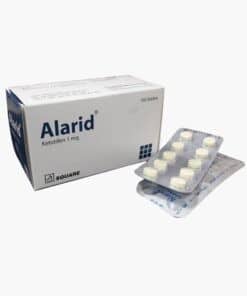Cyclopan | Syrup | 50 ml | 1 pcs
৳ 34.00
Brand Name: Cyclopan Syrup
Generic: Dicycloverine Hydrochloride
10 mg/5 ml
Manufacturer: Incepta Pharmaceuticals Ltd.
50 ml bottle: ৳ 34.00
Indications
Dicycloverine is indicated in:
- Irritable bowel syndrome (Diarrhea Predominant)
- Infantile colic
- GIT spasm
- Diverticulitis
- Abdominal colic
- Diarrhea
- Dysentery.
Therapeutic Class
Anticholinergics (antimuscarinics)/ Anti-spasmodics
Pharmacology
Dicycloverine Hydrochloride is an antispasmodic and anticholinergic (antimuscarinic) agent. Dicycloverine relieves smooth muscle spasm of the gastrointestinal tract, urinary bladder & ureter. It works at specific receptors, called cholinergic (or muscarinic) receptors, located on the involuntary muscle in the walls of the gut. As antispasmodic drug Dicycloverine causes the gut muscle to relax, relieving the pain of colic produced by gut muscle contraction and spasm. Also it has direct musculotropic action.
Dosage & Administration
Adult: 10-20 mg three times daily
Children (2-12 years): 10 mg three times daily
Infant (6 months-2 years): 5-10 mg (1/2-1 teaspoonful syrup) three times daily, 15 minutes before feeds.
Infant (under 6 months): Dicycloverine should not be used under 6 month of age.
Children (2-12 years): 10 mg three times daily
Infant (6 months-2 years): 5-10 mg (1/2-1 teaspoonful syrup) three times daily, 15 minutes before feeds.
Infant (under 6 months): Dicycloverine should not be used under 6 month of age.
Interaction
The following agents may increase certain actions or side effects of anticholinergic drugs: amantadine, antiarrythmic agent of class 1 (e.g. quinidine), antihistamines, antipsychotic agents (e.g. phenothiazines), MAO inhibitors, narcotic analgesics (e.g. meperidine), nitrates and nitrites, sympathomimetic agents, tricyclic antidepressants, and other drugs having anticholinergic activity. Dicycloverine may affect the gastrointestinal absorption of various drugs, such as digoxin, metoclopramide.
Contraindications
Dicycloverine is contraindicated in:
- Obstructive uropathy
- Obstructive disease of the gastrointestinal tract
- Severe ulcerative colitis
- Reflux esophagitis
- Unstable cardiovascular status in acute hemorrhage
- Glaucoma
- Myasthenia gravis
- Evidence of prior hypersensitivity to dicycloverine hydrochloride or other ingredients of this formulation
- Infants less than 6 months of age
Side Effects
Side effects include constipation, transient bradycardia (followed by tachycardia, palpitations and arrhythmias), reduced bronchial secretions, urinary urgency and retention, dilatations of the pupils with loss of accommodation, photophobia, dry mouth, flushing and dryness of the skin.
Pregnancy & Lactation
Dicycloverine should be used during pregnancy only if clearly needed. No teratogenic effect was shown in animal study. Since Dicycloverine hydrochloride has been reported to be secreted in human milk. So, Dicycloverine is contraindicated in lactating mother.
Precautions & Warnings
Dicycloverine should be used with caution in patient with autonomic neuropathy, hepatic or renal disease, ulcerative colitis; large doses may suppress intestinal motility to the point of producing a paralytic ileus and the use of this drug may precipitate or aggravate the serious complication of toxic megacolon, hyperthyroidism, hypertension, coronary heart disease, congestive heart failure, cardiac tachyarrythmia, hiatal hernia, known or expected prostatic hypertrophy.
Overdose Effects
The signs and symptoms of overdosage are headache, nausea; vomiting; blurred vision; dilated pupils; hot, dry skin; dizziness; dryness of the mouth; difficulty in swallowing; and CNS stimulation. Treatment should consist of gastric lavage, emetics and activated charcoal. Sedatives (e.g., Short-acting barbiturates, benzodiazepines) may be used for the management of overt signs of excitement. If indicated, an appropriate cholinergic agent may be used as an antidote.
Storage Conditions
Store in a cool and dry place. Protect from light.
| Generic Name | Dicycloverine Hydrochloride |
|---|---|
| bottle | 50 ml |
Only logged in customers who have purchased this product may leave a review.












Reviews
There are no reviews yet.